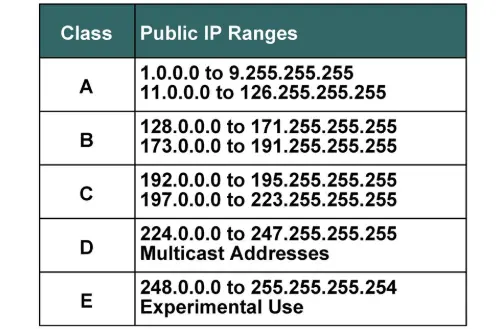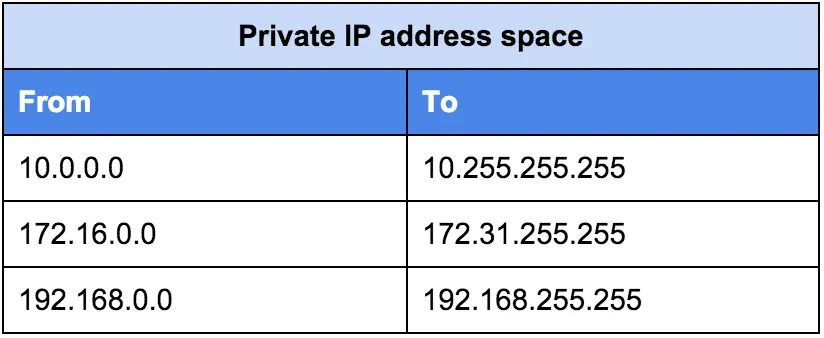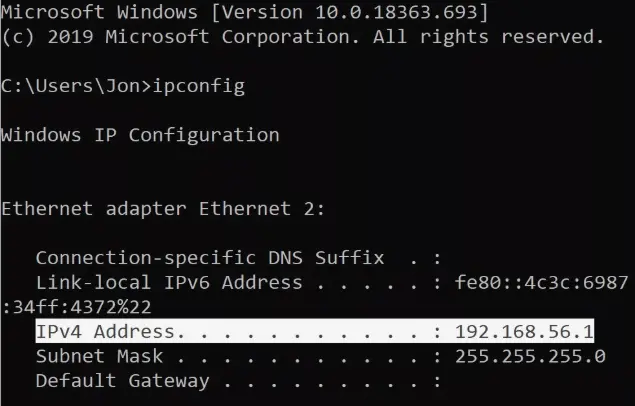Private IP’s were originally meant as a more secure means of providing IPv4 addresses to devices because private IP’s are not routable over the internet. You do have to turn them into some sort of public address if you want to route over the internet. That could be via a public IPv4 or IPv6 address.
Public IP Addressing
A public IP address is an IP address that your home or business router receives from your ISP. Public IP addresses are required for any publicly accessible network hardware such as a home router and the servers that host websites. Public IP addresses differentiate the devices that are plugged into the public internet. Each device that accesses the internet uses a unique IP address. A public IP address is sometimes called an Internet IP.
It’s this address that each Internet Service Provider uses to forward internet requests to a specific home or business, similar to how a delivery vehicle uses a physical address to forward packages to your house. Think of your public IP address as any other address you have. For example, your email address and your home address are unique to you, which is why sending mail to those addresses ensures that messages get to you and not someone else.
The same exclusivity is applied to your IP address so your digital requests are sent to your network and not another network.
Range of Public IP Addresses
Certain IP addresses are reserved for public use and others for private use. This is what makes private IP addresses unable to reach the public internet, because they aren’t able to communicate properly unless they exist behind a router.
The following ranges are reserved by the Internet Assigned Numbers Authority (IANA) for use as private IPv4 addresses:
• 10.0.0.0 to 10.255.255.255
• 172.16.0.0 to 172.31.255.255
• 192.168.0.0 to 192.168.255.255
Excluding the addresses above, public IP addresses range from 1 to 191. The 192.x.x.x addresses are not registered publicly, which means they can only be used behind a router as private IP addresses. This range is where most private IP addresses fall, which is why the default IP address for most Linksys, D-Link, Cisco, and NETGEAR routers is an IP within this set.

Private IP Addressing
A private IP address, sometimes called a local IP address, is an IP address reserved for use on a private network. These devices can’t be accessed by outside their own network—they’re effectively invisible, except to each other. Private IP addresses can be either static or dynamic, but in each case, the available addresses are limited to a pool set aside specifically for being private. These addresses are different from public IP addresses in that they don’t have to be unique—other devices can use the same address provided they aren’t on the same network. This is because devices on the private network can’t communicate with outside devices, which eliminates the risk of an address conflict.
Which IP Addresses Are Private?
The Internet Assigned Numbers Authority (IANA) reserves the following IP address blocks for use as private IP addresses:
• 10.0.0.0 to 10.255.255.255
• 172.16.0.0 to 172.31.255.255
• 192.168.0.0 to 192.168.255.255
The first set of IP addresses allow for over 16 million addresses, the second for over 1 million, and over 65,000 for the last range. Another range of private IP addresses is 169.254.0.0 to 169.254.255.255, but those are for Automatic Private IP Addressing (APIPA) use only. In 2012, the IANA allocated 4 million addresses of 100.64.0.0/10 for use in carrier-grade NAT environments.

Why Private IP Addresses Are Used?
Instead of having devices inside a home or business network each use a public IP address, of which there’s a limited supply, private IP addresses provide an entirely separate set of addresses that allow access on a network but without taking up a public IP address space.
For example, most routers in homes and businesses across the globe have the IP address of 192.168.1.1, and assign 192.168.1.2, 192.168.1.3, … to the various devices that connect to it (using DHCP). It doesn’t matter how many routers use the 192.168.1.1 address, or how many dozens or hundreds of devices inside that network share IP addresses with users of other networks because they aren’t communicating with each other directly. Instead, the devices in a network use the router to translate requests through the public IP address, which can communicate with other public IP addresses and eventually to other local networks.
The hardware within a specific network that’s using a private IP address can communicate with all the other hardware within the confines of that network but require a router to communicate with devices outside the network, after which the public IP address is used for the communication.For example, before landing on this page, your device (such as a computer, phone, or tablet), which uses a private IP address, requested this page through a router, which has a public IP address. Once the request was made and Lifewire responded to deliver the page, it was downloaded to your device through a public IP address before reaching your router, after which it was handed off to your private/local address to reach your device.
All the devices (laptops, desktops, phones, tablets, and others) that are contained within private networks around the world can use a private IP address with virtually no limitation, which can’t be said for public IP addresses. Private IP addresses also provide a way for devices that don’t need a connection to the internet, such as file servers and printers, to communicate with the other devices on a network without being directly exposed to the public.
How to Find Your Private IP Address
If you want to connect one computer to another on your network, for example, a mapped network drive, you can do so through its local IP address. You can also use a local IP address with remote desktop software to control a computer from afar. A private IP address is also needed to direct a specific network port from a router to a particular computer on the same network, a process called port forwarding.
The easiest way to find your private IP address in Windows is to use Command Prompt with the ipconfig command.

Advantages of Using a Private IP?
• Data protection and privacy: One of the biggest reasons to choose a private address space is privacy. Since devices on the private network aren’t connected to the outside internet, no data can enter or exit the network. That means sensitive data can only be accessed from those devices, making this setup perfect for small businesses that handle a lot of data.
• Security: A private address space is generally more secure than a typical public network, for the same reason it is more private: lack of access. It’s hard for malware and viruses to make their way onto a network when it’s closed off from outside access.
Hiding Your Public IP Address
You can’t hide your public IP address from your ISP because all of your traffic has to move through them before reaching anything else on the internet. However, you can hide your IP address from the websites you visit, as well as encrypt the data transfers (thus hiding traffic from your ISP), by first filtering your data through a virtual private network (VPN).
Normally, when accessing a website, that website can see that your specific public IP address requested to view their website. Doing a quick search on one of the IP finding websites would tell that website who your ISP is. Since your ISP knows which IP addresses have been assigned to you, specifically, would mean that your visit to the website could be pinned directly to you. Using a VPN service adds another ISP at the end of your request before you open another website. Once connected to a VPN, the same process as above takes place, only this time, instead of the website seeing the IP address that your ISP has assigned to you, they see the IP address that the VPN has assigned.
Is a Private IP Network Right for My Business?
This is mainly a question of security versus convenience. Since a private address space is isolated from outside communication, information on the network is very\ secure, and it’s much harder for viruses and malware to enter the network and infect your business’s devices. So, if data privacy and security are vital to your business’s operations, you may want to choose a private IP network.
However, you’ll have to be prepared for the possible hassles of a closed network—this could mean needing additional equipment to connect to the public internet or possibly setting up a network-based IP VPN so you can still conduct standard business transactions without sacrificing security. Armed with this information, you should be able to decide if private IP addresses are right for your business. If powerful security is paramount, a private network can be an excellent tool.




